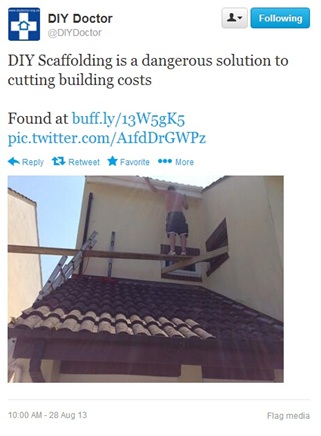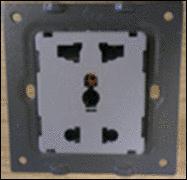Today The Construction Enquirer have put up a news story concerning the outcome of a Bolton building firm's court case whose scaffolding was deemed to present a risk to the crew.
The firm, R Hamer Ltd, was prosecuted after a member of the public reported the work to the Health & Safety executive. Two workers had been spotted replacing guttering during high winds on what appeared to be unsafe scaffolding, and when an inspector arrive he found the men using two "badly-erected" towers with an unsecured board being used as walkway between them.
The court was told there was also no edge protection on the scaffolding, such as handrails or toe boards, and the workers were not using harnesses to prevent them being injured in a fall. One of the men was also seen climbing down the outside of the scaffolding rather than using an access ladder. The firm received a 12-month conditional discharge and ordered to pay £562 in prosecution costs, which is a rather leniant sentence for something that could have endangered lives.
This news story reminded me of a tweet I had seen earlier last week from @DIYDoctor, which I've shared below:

Falling from heights is one of the biggest causes of workplace death in the construction industry, and can easily be avoided by using safe and secure scaffolding. If you see a construction firm not taking the right precautions, you should report them to the HSE before an accident can happen. Likewise if you're doing a bit of exterior DIY don't think you can just get away with precariously balancing on the roof and a carefully laid out piece of wood like the man above. Otherwise that little job could end up costing you your life.

Summer holidays on the Costas are with us once again. Lots of families are jetting off to spend a week or two in the sunshine. All looking to have fun and this will probably mean consuming large quantities of alcohol.
But we have become so reliant on our electrical and electronic gizmos; we all need an adapter to charge them up whilst we are in foreign lands. Our UK standard plugs will not fit into the sockets that we find in our ‘little paradise’.
Off we go to the local supermarket to purchase an adapter – but they are not cheap, so plan B comes into action. Off we go to the ‘cheap’ shop (you know the ones – everything’s a pound!). But is that cheap product safe? Probably not!
The above item is the subject of a “Product Recall” as it has been identified as being UNSAFE.
“The product poses a risk of electric shock because the user comes into contact with live parts when inserting the plug into the socket. The product does not comply with the relevant national standard BS1363.”
What a wonderful holiday – a couple of days in the sun followed by a couple of days in hospital receiving treatment for electric shock and/or electric burns; if you lucky. If you’re not you might be flying home baggage class in a wooden box!
You can’t put a price on safety; remember it might by your child that gets the shock of their lives!
For more information on this and other recalled products visit the Electrical Safety Council website at:
http://www.esc.org.uk/public/guides-and-advice/product-recalls/
- Mark Jenkins
Mark Jenkins is the Electrical Course Development Manager at Access Training. If you would like to learn more about electrical work and maintenance, you might want to consider one of the many electrical training courses we offer. These are available for both DIY enthusiasts AND people looking to gain the vital qualifications needed to make the career change to become an electrician. To find out more give us a call on 0800 345 7492.
The Electrical Safety Council is calling for manufacturers to face tougher penalties if they undertake inadequate or slow recalls, following growing concerns over the effectiveness of the recall system and the emergence of a number of serious incidents involving recalled products.
Manufacturers who delay or take action in a recall situation currently face fines of only £5,000.
The ESC would like to see tougher penalties based on a percentage of profits from the recalled product, with a minimum level set at £5,000. This should ensure manufacturers react quickly and effectively should a recall situation arise.
The ESC is also inviting Trading Standards to set out clear and unambiguous guidelines on exactly what a manufacturer should do if they have produced a product that is subject to a recall. The ESC’s research shows that typically only 10-20% of recalled electrical products are ever returned, exposing millions of people in the UK to the risk of fire or electrocution. Over the last six years there have been 266 recall notices for electrical items.
In addition to the proposed change to fines, the Electrical Safety Council has today outlined proposals for a new centralised product registration system, coordinated by the charity, which could help manufacturers trace their products to the consumer in a recall situation.
At the moment only 5-10% of people fill in registration cards for new items because they are concerned about their information being used for marketing purposes and because they don’t understand the purpose of the cards. Yet over half of all the people that took part in the Electrical Safety Council’s research said they would be more likely to register products with an independent organisation, if their details were used only in the event of a recall and if they were assured their details wouldn’t be used for marketing purposes.
Do you fill in and send off the produce registration card? Or do you, like many people just throw it away? It’s there for a reason – keeping you and your families safe. Next time you purchase a new product do everyone a favour – FILL IN THE CARD AND SEND IT OFF!
- Mark Jenkins